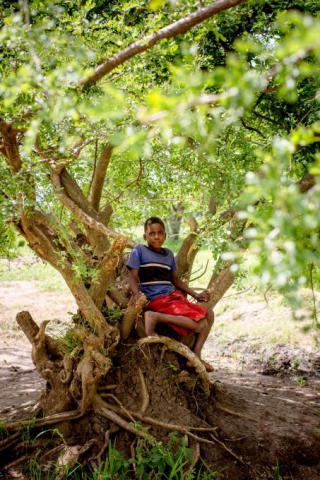Improved Collaboration Yielding Fruits
Mwembedzi is a primary school in Mwanza district that is situated near the boundary with Chikwawa district. The school has four feeder villages namely: Ngadziwe, Mdzinja, Mwalemera and Jeke – characterised by many children who drop out of school due to poverty and lack of parental interest.
Like many schools in Malawi, the school has governance structures including Mother Groups (MGs), School Management Committees (SMCs) and Parents Teacher Associations (PTAs).
Although members of the community structures were briefed on their roles and responsibilities when they were elected in 2013, they were still not very clear on their areas of operation and jurisdiction. Cases of role conflict among the members were common and there was poor coordination among the structures themselves as well as between the structures and the school.
Consequently, members of the structures became passive and could not effectively support activities that promote education at the school.
In December 2015, Save the Children and the Association of Progressive Women (APW) facilitated a training of the community structures on their roles and responsibilities – being one of the core mandates of the Quality Learning and Accountability (QLA) project under the Norad Framework Agreement of 2015 to 2018.
The training targeted all members of governance structures in all primary schools in Mwanza district. As a result of this training, members of community structures from Mwembedzi -Primary School had a clear understanding of their roles and responsibilities. They became very active so much so that the school started registering successes through improved collaboration and coordination among the structures themselves and between the structures and the school.
They started conducting joint planning and review meetings and have since demonstrated a commitment to activities that support learning at the school in many ways. For instance, members of the SMC conduct routine monitoring visits to the school observing lessons live in classes.

Photo Caption: A boy from the Neno district who had been helped to return to school by the QLA project after dropping out.
In January, 2017, members of the Mother Group successfully tracked and brought back 6 students (3 boys, 3 girls) to school who had dropped out due to lack of school uniforms. They contributed money and bought school uniforms for all these children.
When interviewed, Sitima Grant, SMC Chair, had this to said, “through various trainings and guidance we have received from the QLA Project we are now able to conduct monitoring visits to the school and observe lessons”.
The fruits of improved collaboration and coordination were also manifested at Mwembedzi Primary School in February 2017, when the school managed to bring back 9 students (5 boys, 4 girls) who had dropped out of school – courtesy of joint efforts of a Mother Group and a PTA. “The QLA project has helped cement relationships among parents, teachers and learners, thus creating an enabling environment for us members of community structures to discharge our duties, for example, learner tracking activities freely,” commented Rose Makoko, the Mother Group Chairperson.
The QLA Project is a four-year project under the Norad Framework Agreement 2015-2018. It is being implemented by Save the Children and its partners Association of Progressive Women (APW), Community Action for Sustainable Development Organization (CASDO), Malawi Human Rights Commission (MHRC) and NGO Coalition on the Rights of Children (NGO CRC) in all Traditional Authorities in Mwanza and Neno districts with funding from the Norwegian Agency for Development Cooperation (NORAD) through Save the Children Norway.
Co-authored by Margaret Masamba, Senior Programme Manager [QLA Project] and Martin Kadaona, MEAL Officer [QLA Project]
 Malawi
Malawi